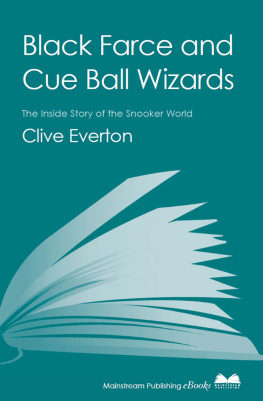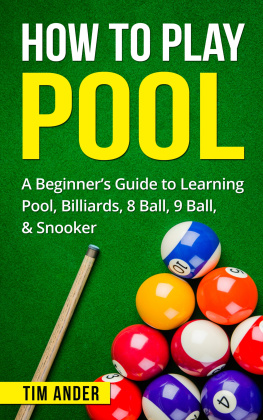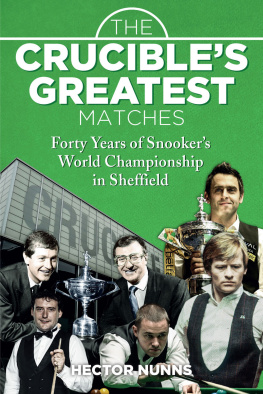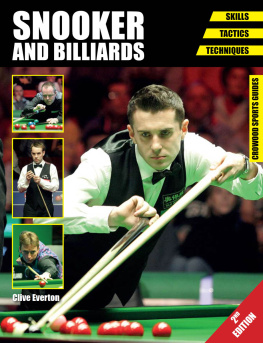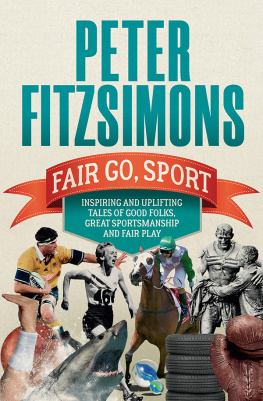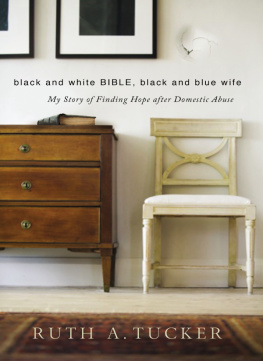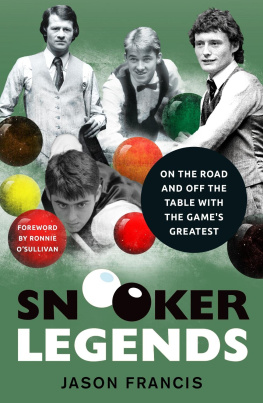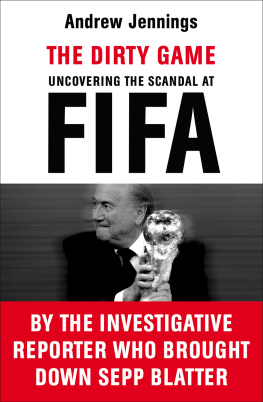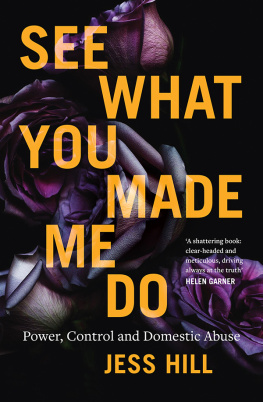CONTENTS
BLACK FARCE AND CUE BALL WIZARDS
The Inside Story of the Snooker World
Clive Everton
This eBook is copyright material and must not be copied, reproduced, transferred, distributed, leased, licenced or publicly performed or used in any way except as specifically permitted in writing by the publishers, as allowed under the terms and conditions under which it was purchased or as strictly permitted by applicable copyright law. Any unauthorised distribution or use of this text may be a direct infringement of the authors and publishers rights and those responsible may be liable in law accordingly.
Epub ISBN: 9781780573991
Version 1.0
www.mainstreampublishing.com
Copyright Clive Everton, 2007
All rights reserved
The moral right of the author has been asserted
First published in Great Britain in 2007 by
MAINSTREAM PUBLISHING COMPANY
(EDINBURGH) LTD
7 Albany Street
Edinburgh EH1 3UG
ISBN 9781845961992
No part of this book may be reproduced or transmitted in any form or by any other means without permission in writing from the publisher, except by a reviewer who wishes to quote brief passages in connection with a review written for insertion in a magazine, newspaper or broadcast
A catalogue record for this book is available from the British Library
PROLOGUE
J UST PAST MIDNIGHT ON THE 1985 MAY BANK HOLIDAY, 18.5 MILLION BBC2 viewers saw Dennis Taylor pot the last black of the deciding 35th frame to beat Steve Davis in their epic Embassy World Championship final.
To anyone who remembered snooker sinking so low in public esteem that it could boast no more than half a dozen professionals, with the championship itself dormant for seven years because no one thought it worth promoting, it was amazing that the game had become a prime television attraction and that its leading exponents could become millionaires through prize money generated principally by sponsorship and television fees.
For 50 years, snooker had been a widely played folk sport whose grass roots following had always been underestimated. Now, it was right up there in sports major league and success would beget success.
That, at least, was the theory. Instead, snooker frittered away its potentialities through incompetence, mismanagement and worse. Through my magazine, Snooker Scene, and elsewhere, I charted the careers of the leading players and, with horrified fascination, the sports eternal internecine strife as it missed one chance after another to consolidate its future.
My emotional commitment to the game dated back to boyhood and one rainy London afternoon when my father and I settled into the plush fauteuils of Leicester Square Hall, which was then the 220-seat home of the professional game. From the first click of the balls, I was entranced and even now, in the imperishable action replay of my memory, I see Sidney Smith completing the first century break I ever saw.
Back home, I had a friend who had a quarter-size table we used to play on. I pestered my parents for one of my own. A few months later, by special dispensation, my father took me into his club. A full-size table looked like a 40-acre field. I played when and where I could. There was a disreputable billiard hall in an alley in the Shambles area of Worcester, where I was at school. I saw a newspaper article and entered the 1951 British Under 16 Billiards Championship.
As I had been playing on a full-size table for only three months, I was not surprised to lose in the first round, but the experience of playing in the womb-like amphitheatre of Burroughes and Watts, Soho Square, the Mecca of the amateur game, which was just as plush and even more intimate than Leicester Square Hall, sank the hook of the game deeper into me.
BBC Television, casting about desperately for Saturday afternoon sporting action, covered the final the following year with Sidney Smith, the commentator, seated in the back row. I found it disconcerting at times to hear him predict more than once a shot different to my own choice, but I won easily and Alec Bedser, the Surrey and England cricketer, presented me with the trophy. Far from making me any kind of hero at school Kings, Worcester this success made me more of an outsider and nurtured, in turn, my anti-establishment instincts. My headmaster, F.R. Kittermaster, an Old Rugbeian from the Thomas Arnold tradition, wrote in Sport and Society that only sports with an element of physical danger, like rugby, cricket or hockey, were character building. He was fond of insisting: You came here to be made into gentlemen. Proficiency at billiards, the classic sign of a misspent youth, did not fit into his definition.
In practical ways, my father was always very helpful but like many parents of his generation because this had been done to him he was incapable of praising me to my face.
You didnt have much to beat, did you? he said in the immediate aftermath of me winning the 1952 British Under 16 Billiards. Well, what does it mean? What can you do? Whod give you a job? I wouldnt, he was to say genially of my BA Hons on degree day at Cardiff University. When I won the Welsh Billiards Championship at the age of 22, he said: Yes, but you cant make a living out of it, can you? He was right about that at the time, as the professional game had sunk to an all-time low.
Save for wanting to get married, I would have stayed in Cardiff, but a friend of Valeries father fixed me up with a teaching job at a college of further education in Halesowen on the outskirts of Birmingham. I taught English and liberal studies though I never found out what they were and at the time it was the only job which would guarantee me 750 a year. I was neither unselfish enough to want to devote my career to teaching nor callous enough to do it so lazily that my students would not pass their exams, but journalism was what Id always wanted to do. In my innocence, I thought it would be better than working.
The problem was a point of entry. I was willing to start small and I could not have started smaller. I used to practise sometimes with Rex Williams who, frustrated by lack of competitive opportunities and mindful of the need to keep in the public eye, negotiated two columns, one with the Wolverhampton Express and Star, the other with its sporting pink. Each paid two guineas, which we split down the middle. Around this time, I also sold printing and stationery part-time for his fathers Blackheath Printing Works.
In the summers, tennis was my game. From when I won the under 15 singles on Malverns centre court under its grassy bank of spectators, I was just as keen on it as I was on billiards and snooker in the winters. The summer holidays I spent going from one junior tournament to another were irretrievably happy times with enough success for hope and enjoyment to carry me forward.
My decent serve and backhand, my slowness on the turn and my suspect forehand, particularly out wide, added up to a game unfitted for glorious achievement but sufficient to keep me in the Worcestershire team for 13 years. At County Week, the inter-county grass court championships, we travailed between groups three and five as we explored each July a succession of politely run-down English seaside resorts, Felixstowe, Cromer, Frinton, Scarborough, Budleigh Salterton, Southsea and Minehead amongst them. I was in a winning pair against Mike Sangster two weeks after he reached the Wimbledon semi-finals; I was in a losing pair to Bedfordshires non-playing captain, called up in desperation and borrowed gear to play his first match in five years.

